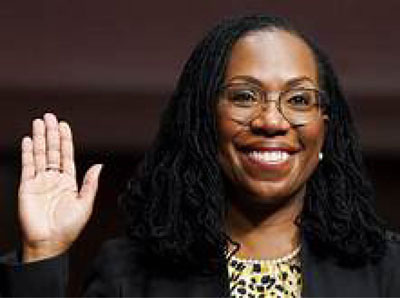Ketanji Brown Jackson does not have the back-ground typical of US Supreme Court judges. And not just because she’s an African-American woman.
While many judges have made their mark as prosecutors, Jackson spent two years as a federal public defender representing indigent defendants.
She has served on the US Sentencing Commis-sion, an independent agency created by Congress in 1984 to address sentencing disparities.
And Jackson has personal experience with the harsh sentences meted out for drug crimes in the United States — an uncle was sentenced to life in prison in 1989 for cocaine possession.
“For Ketanji, the law isn’t just an abstract set of concepts,” a friend and former colleague from the public defender’s office told The Washington Post.
“Her family’s experience does inform her awareness of the real impact the law has on people’s lives,” the friend said.
The 51-year-old Jackson noted her non-traditional background in her 2021 Senate confirma-tion hearing for a seat on the US Circuit Court of Appeals.
“I’ve experienced life in perhaps a different way than some of my colleagues because of who I am, and that might be valuable — I hope it would be valuable — if I was confirmed to the court,” she said.
President Joe Biden nominated Jackson Friday to replace Justice Stephen Breyer, a liberal stalwart who announced last month he would retire at the end of the current court term. If confirmed by the Senate, Jackson would be the first Black woman to serve on the nation’s highest court.
There have been two African-American Supreme Court justices: Thurgood Marshall, who served from 1967 to 1991, and Clarence Thomas, who succeeded Marshall and remains on the bench.
– Parents were school teachers – Jackson was born in Washington but grew up in Florida, where her parents were school teachers.
Her father went on to become a lawyer for the Miami school board while her mother became a principal.
Jackson received her law degree from Harvard Law School in 1996, where she was a member of the Black Law Students Association and Harvard Law Review.
After graduation, she worked for a series of elite law firms in Boston and Washington and as a law clerk for Breyer in 1999 and 2000.
Jackson became an assistant special counsel with the US Sentencing Commission in 2003 and worked for the Office of the Federal Public Defender in Washington from 2005 to 2007.
While she was at the public defender’s office, her father’s incarcerated older brother, Thomas Brown Jr, reached out to her asking for help getting him out of prison, according to the Post.
She passed on his appeal to a top private law firm and Brown eventually had his sentence commuted, in November 2016 by Barack Obama, one of hundreds of nonviolent drug offenders who had their sentences reduced during his presidency.
– ‘Presidents are not kings’ – Jackson was nomi-nated to be a US District Court judge by Obama in 2013.
Her most notable ruling came in 2019 when she said a former White House counsel to president Donald Trump had to obey a congressional sub-poena. “Presidents are not kings,” Jackson wrote.—APP









